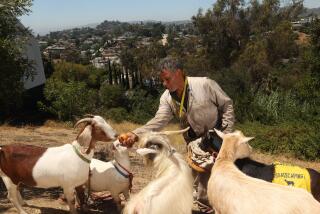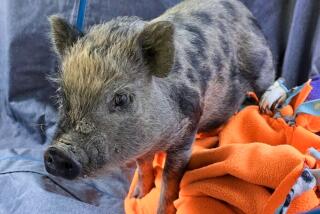Hoofing It : Told to Give Up Pigs, Family to Move Instead
- Share via
LA HABRA HEIGHTS — Gerald and Kathleen Hartinger, having lost a yearlong battle to keep their miniature Vietnamese potbellied pigs, will part with La Habra Heights rather than their swine.
In a compromise recently reached with the city and neighbors, the Hartingers will be allowed to keep their pigs for the next six months. During that time, the Hartingers plan to fix up and sell the mountainside home where they have bred dogs, raised chickens and reared children for 18 years.
They said they hope to move to Northern California.
The Hartingers said the miniature pigs, Elmer and Miss Piggy, are pets and deserve to be treated that way. But some neighbors called them smelly, noisy farm animals, and accused the Hartingers of wanting to start a pig farm.
The Hartingers suspect there are other forces at work, that one or two neighbors don’t particularly like them and that in some ways perhaps La Habra Heights’ growing sophistication and wealth has made their community too gentrified for a middle-class, beer-loving eccentric and his down-home family.
The Hartingers acknowledge that they feel more out of place in their secluded neighborhood canyon than they used to. From his driveway, Gerald Hartinger can look to the top of the canyon where several old ranch houses have been torn down, to be replaced by palatial 7,000-square-foot estates. On either side are neighbors who have bought their homes in the last five years, for prices as much as 10 times what the Hartingers paid.
Property values have shot up in this city of 5,400, which remains a rustic island in the urban sprawl of Los Angeles County. But while the countryside appeals to newcomers, a rural lifestyle that involves raising animals may not.
“I really have noticed a difference,” said City Council member Diane Kane, a 10-year resident. “The people building the new homes are professionals, highly educated and very well off. They are coming to La Habra Heights because they want to build their dream homes. They do not have the same interest in animals.”
Or the same tolerance for animal smells and noises.
It was the odor and the squealing, said Patricia Caywood, that prompted her and Robert Barrios to ask the city to enforce a longstanding city ordinance prohibiting pigs. The city cited the Hartingers last October, shortly after they purchased the pair of pigs for $3,500. The no-pig ordinance dates from a time when there was local concern over swine as a source of disease.
The ordinance had been ignored for years by 4-H groups, which have encouraged local youngsters to raise baby pigs to adulthood. These livestock pigs are typically entered in contests and sold at fairs or meat markets when they reach about six months of age. In part, the city’s anti-pig policy became lax because, by the time it would have been enforced, the 4-H animals were pork chops anyway. Besides, the 12-year-old city’s general charter encourages the keeping of animals. The city’s seal features a galloping horse front and center.
Most importantly, no one complained. Barring an immediate health and safety risk, the city, because of manpower shortages, will only enforce an animal ordinance if a complaint is filed, city officials said.
Kathleen Hartinger, 46, can’t imagine why her pet pigs would bother anyone. The 1-year-old male, Elmer, whom she calls “her baby,” has become her favorite among the family’s animal menagerie, which includes three cats, four dogs, a rooster, four chickens and two ducks. Elmer will come when called (most of the time), will sit on command (more or less), sleep at the foot of the bed, eat cottage cheese and candy out of Hartinger’s hand and recline at her feet.
“He’ll nudge me till I have to go sit down,” she said, during a recent visit. With at least 140 pounds behind his snout, Elmer’s friendly, but insistent nudge is sufficient persuasion to prompt Hartinger to scratch the porker behind the ears, or on the top of his back near his wagging six-inch tail. Hartinger said Elmer justifies breeders’ claims that potbellied pigs are both smart and affectionate.
Elmer’s face is a succession of jowls upon jowls, leaving his brown eyes barely visible behind his fleshy face and bristly black fur. True to his brand name, Elmer sports a near-ground-hugging potbelly, although his girth does not compare to the stouter Miss Piggy, who also is a year old.
The Hartingers noted with regret that Miss Piggy’s main interests have diminished to sleeping and eating. She is more comfortable outdoors than in and shows little affection. The Hartingers suspect Miss Piggy may not be purebred because her behavior is too, well, pig-like.
But the couple went to bat for both, asking the city to delete its no-swine rules. At Planning Commission hearings over a five-month period, there was substantial support for and against the idea. However, council member Kane said that no pig proponents emerged from among the neighbors whose property bordered the Hartingers.
“Would you want a pig living next to you?” she asked rhetorically. “Most of them said they didn’t.”
4-H enthusiasts, not wanting to lose their pig privileges, added to the cacophony. The ordinance that emerged and became law in July made almost everyone happy except the Hartingers. 4-H projects are now protected by statute. Pigs are allowed too, but only one pig per 20,000 square feet. The Hartingers’ lot is 17,000 square feet.
By contrast, a horse, cow, sheep or goat requires only 5,000 square feet of space per animal. The city made no allowances for potbellied pigs. And pigpens have to be at least 50 feet from any property border. The tougher swine standards were built in to diminish any pig smell that might waft from one property to the next.
One council member, who requested anonymity, said that the Hartingers’ original pen was much closer to one neighbor’s home than their own.
The Hartingers once invited city officials over to demonstrate that their pigs did not smell. “The female released right in front of the planning commissioner, and he said he didn’t smell anything out of the ordinary,” Kathleen Hartinger said. “The mayor admitted he didn’t smell anything out of the ordinary either, though he said it didn’t smell like my doctor’s office.” Mayor John Wible could not be reached for comment.
As far as the Hartingers are concerned, their whole dilemma has the odor of a personal vendetta by particular neighbors who do not like their nonconformist ways.
“If it wasn’t the pigs, it would have been something else,” Kathleen Hartinger said, noting that there have also been complaints lodged against them about the number of cats and dogs they have, about their son riding his bike along the private road they share with neighbors, and about their yard. The curios on their cluttered homestead include a 27-foot boat, a firetruck bought off a movie set, six old tires, a tub, working and rusting bicycles, animal manure piles, and at least 17 plastic bags filled with empty beer cans.
“I buy whatever beer’s on sale,” said Gerald Hartinger, a 54-year-old independent contractor who installs telephone lines. “Last time I had the bags picked up, a guy gave me $1,000 for the beer cans without even counting them.”
Much of the back yard is filled with avocado trees. La Habra Heights was famous for avocado ranching from the 1920s until recent years. From their back yard deck, the Hartingers can see Santa Catalina Island on rare, smog-free days.
The Hartingers had moved to the area from Inglewood.
“It’s an ideal place to raise kids,” Kathleen Hartinger said. “They learned how to take care of chickens, collect eggs. They had a pony. All my kids have turned out super, and I do believe it’s because they were raised in a rural area.
“Leaving hurts me a lot,” she said. “My son is in the volunteer fire department. My last one was born here. He’s 13. He’s built up a lot of hatred, which I hate to see. He doesn’t want to study the Bill of Rights in school because he feels there are none. It’s for the people with big, expensive houses.”
To concentrate on sprucing up the house for sale, Hartinger quit her job in July as a secretary for a meat broker. “They sell pork,” she admitted sheepishly. “I typed out confirmations for pork ears and it would make me sick. But I loved my boss. He was very understanding.”
The Hartingers and their live pork are headed for Northern California, they say, near Lake Tahoe, to a place that not even large shopping malls have reached.
Gerald Hartinger looked across the valley outside his home. “Next thing, there’s gonna be no roosters. Who knows what’s gonna happen?”
More to Read
Sign up for Essential California
The most important California stories and recommendations in your inbox every morning.
You may occasionally receive promotional content from the Los Angeles Times.














